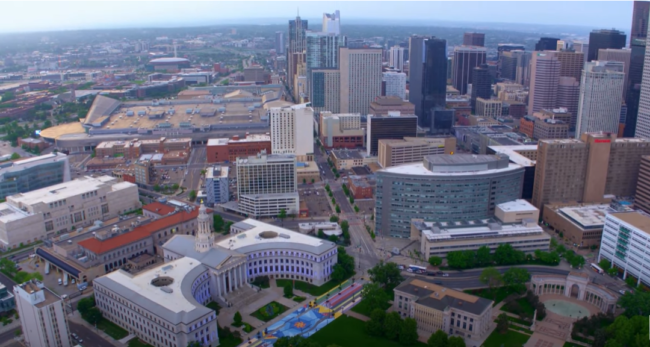Denver is the capital of Colorado, a state located in the western United States. The city is situated in the eastern part of the Rocky Mountains and is known for its natural beauty, rich history, and diverse culture. Denver has grown from a small mining town to a bustling metropolis with a population of over 700,000 people. However, the story of how Denver became the capital of Colorado is a fascinating one, rooted in history, politics, and geography.
The history of Denver dates back to the mid-19th century when gold was discovered in the area. The discovery of gold led to a rush of settlers who came to Colorado seeking their fortune. Denver, at that time, was just a small settlement that grew rapidly as miners and settlers flocked to the region. The city’s population grew from a few hundred people in 1858 to over 100,000 by 1900.
As Denver grew, so did its importance in the region. In 1861, the Colorado Territory was established, and Denver was chosen as its capital. At the time, Denver was a natural choice as it was the largest city in the territory and had a central location that made it easily accessible to all parts of the region. The city also had a well-established infrastructure, which made it an attractive choice for the territorial government.
However, the selection of Denver as the capital of Colorado was not without controversy. At the time, there were other cities that were vying for the title of capital, including Colorado Springs, Pueblo, and Boulder. These cities were seen as more established and cultured, and many believed that they were better suited to be the capital of the state.
Despite the controversy, Denver was ultimately chosen as the capital of Colorado, and the territorial government was established there. The city’s growth continued, and it soon became one of the most important cities in the western United States. Denver’s central location made it a hub for transportation and commerce, and the city’s economy boomed as a result.
In addition to its strategic location, Denver was also chosen as the capital of Colorado because of its political influence. At the time, Denver was a stronghold for the Republican Party, which had a significant presence in the state. The Republicans were able to use their influence to push for Denver to be chosen as the capital of Colorado, and their efforts paid off.
Over the years, Denver has continued to grow and evolve. The city has become a center for art, culture, and innovation, and it is home to many of the state’s most important institutions. Denver is also a popular tourist destination, known for its natural beauty, vibrant nightlife, and friendly people.
Denver became the capital of Colorado for a variety of reasons. Its central location, established infrastructure, and political influence all played a role in the decision. However, it was the city’s growth and development over the years that cemented its status as the capital of one of the most important states in the western United States. Denver’s history is a testament to the resilience and determination of the people who call it home, and it continues to be a symbol of the American spirit of progress and opportunity.
Denver’s history as the capital of Colorado is also closely tied to the city’s relationship with the mining industry. In the late 19th century, Colorado was one of the most important mining regions in the world, and Denver was at the center of this industry. The city’s location made it an ideal hub for transportation and commerce, and it became a major center for processing and shipping minerals.
Denver’s connection to the mining industry is evident in many aspects of the city’s history and culture. The Colorado State Capitol building, which houses the state government, is built with Colorado rose onyx, a rare and valuable mineral found in the state. The city also has a rich tradition of mining-related events and festivals, including the Western Mining Conference, which has been held in Denver since the early 20th century.
Despite its association with mining, Denver’s economy has diversified over the years, and the city is now home to a wide range of industries, including technology, healthcare, and finance. Denver is also a major center for outdoor recreation, with access to some of the best skiing, hiking, and camping in the country. The city’s commitment to sustainability and green energy has also made it a leader in environmental initiatives.
In recent years, Denver has become increasingly known as a progressive and forward-thinking city, with a commitment to social justice and environmental sustainability. The city has implemented a number of initiatives to address climate change and reduce carbon emissions, and it has also been a leader in promoting renewable energy and green infrastructure.
Overall, Denver’s history as the capital of Colorado is a reflection of the city’s resilience and adaptability. From its humble beginnings as a small mining town to its current status as a vibrant and dynamic metropolis, Denver has proven itself to be a city that is always looking to the future. Whether it is through its commitment to sustainability, its innovative spirit, or its diverse and welcoming culture, Denver continues to be a city that embodies the best of the American spirit.
Denver’s history as the capital of Colorado is also closely tied to the city’s relationship with the mining industry. In the late 19th century, Colorado was one of the most important mining regions in the world, and Denver was at the center of this industry. The city’s location made it an ideal hub for transportation and commerce, and it became a major center for processing and shipping minerals.
Denver’s connection to the mining industry is evident in many aspects of the city’s history and culture. The Colorado State Capitol building, which houses the state government, is built with Colorado rose onyx, a rare and valuable mineral found in the state. The city also has a rich tradition of mining-related events and festivals, including the Western Mining Conference, which has been held in Denver since the early 20th century. Despite its association with mining, Denver’s economy has diversified over the years, and the city is now home to a wide range of industries, including technology, healthcare, and finance.

